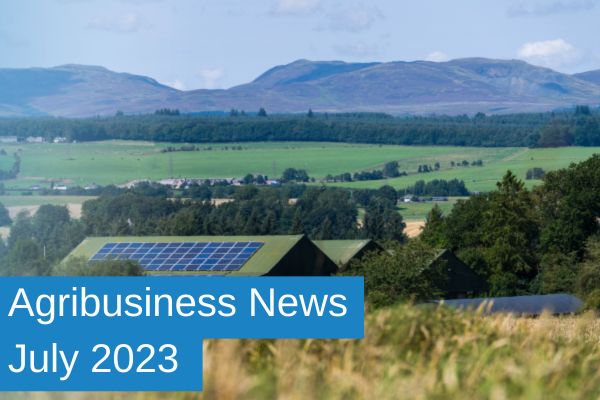Agribusiness News July 2023 – Climate Progress Report Updates
3 July 2023Climate progress update published
At the end of May, the Scottish Government published the 2023 progress report on the Climate Change Plan, detailing progress made across all industries to policy outcomes, including agriculture. While the envelopes of emissions for each sector, drawn from the UK’s National Inventory of Greenhouse Gases, is based on 2020 data (the most recent available), other reporting metrics and progress indicators are drawn from various and more recent datasets.
For 2020, agriculture as an industry was 0.6 Mt CO2e over its emissions envelope of 7.6Mt CO2e, an envelope which is advisory, but not legally binding. To put 0.6 Mt into context, that equates to around 1,300 cars’ equivalent of emissions annually, or 1000 homes. While for 2020 agriculture overstepped its sectoral targets, much progress has been made since 2020 in reducing emissions in Scottish farming, such as two rounds of the Sustainable Agriculture Capital Grant Scheme, wider uptake of carbon auditing, and the National Test Programme funding further carbon reporting and soil carbon testing. Progress on the 5 practice-oriented outcomes is as follows:

CCC reduction recommendations
In December 2022, the Climate Change Committee provided the following recommendations to Scottish Government on reducing emissions in agriculture and land use, with all actions to be undertaken in 2023 other than those with later dates noted.
CAP reform & finance:
- More detail on targeting and delivery of subsidies and schemes, delivering climate and other environmental goals – PRIORITY MEASURE;
- Frameworks for monitoring, reporting, and verification of schemes to assess effectiveness;
- Set out how public and private finance with aligned and enhanced to increase private finance.
Farming practices:
- Take action to overcome financial barriers to low-carbon farming;
- Enhance advice and knowledge on climate mitigation and adaptation for farmers;
- Continue to invest in research and development for low carbon farming practices;
- Increase scope of regulatory components of post-CAP schemes;
- Increase coverage of Nitrate Vulnerable Zones (in 2024).
Forestry & hedgerows:
- Ensure fundings and incentives sufficient to meet planting targets – PRIORITY MEASURE;
- Support for tree nurseries to increase domestic production to meet demand;
- Continue Woodland Carbon Code;
- Develop a plan to increase UK sourced timber production and supply;
- Enhance incentives for agroforestry and hedgerows.
Peatlands:
- Implement a comprehensive mechanism for increased peatland restoration beyond 2030;
- Set out ways that peat soils for agricultural use can be managed in a more sustainable way;
- Set out a timescale for ending domestic and industrial peat extraction, and ban the sale of horticultural peat;
- Implement regulations to prevent bare beat or rotational burning.
Other:
- Address non-financial barriers preventing uptake of low-carbon farming, such as enhancing knowledge and skills and simplifying application processes, support to overcome legal complications etc.;
- Set out clear and fair roadmaps and consequences of net zero on agriculture and land;
- Develop action plan for how energy crops can help to meet emission targets;
- With third parties, provide training and increase capacity to promote sustainable farming;
- Take action to encourage a 20% reduction in meat and dairy by 2030, and food waste by 50% by 2030 (in 2025).
ScotGov response to CCC report
On the 20th June, Scottish Government released their response to the recommendations, with all measures accepted, except for those in italics partially accepted, with justifications:
- Some targets are too ambitious, but progress is under way to run feasibility studies etc., e.g. bioenergy action plan;
- Reluctance to be prescriptive on the reduction in meat and dairy consumption;
- There is no added value of additional measures versus those already in place e.g. NVZ expansion, and fully accepting would suggest insufficiency of current measures;
- Disagree with suggestion that there is a problem with legal setup with leases regarding emissions reduction/sequestration, and concern about objections of landlords;
- Some measures require specific exemptions, such as muirburn and peat extraction for whisky and small-scale domestic use.
anna.sellars@sac.co.uk
Sign up to the FAS newsletter
Receive updates on news, events and publications from Scotland’s Farm Advisory Service

